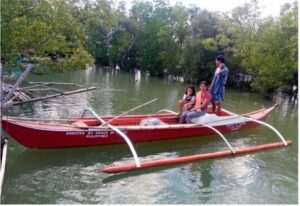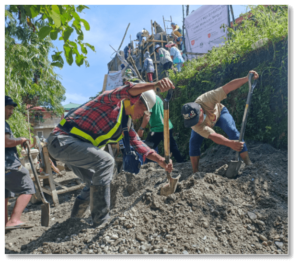The Three Musketeers
Pedro Picornell, Ramon Pedrosa, and Antonio Infante had been picked by Don José to be his “Three Musketeers.” It was at this point that Soriano, being a devout Catholic, businessman, and philanthropist, was approached by Father Olazabal.
Don José often frequented the Casino Español de Manila in Ermita during the annual Dia la Hispanidad with his family (no gambling there — it was the Spanish community’s social club). During one such fiesta, Father Ola came knocking, and Culion was introduced to Don José for the first time. One of the Musketeers, Pedro Picornell, happened to be with him at the fiesta.
Marilen Picornell, Pedro’s daughter, recalls that “what Don José did that my dad didn’t like was that whenever a problem cropped up requiring a solution, Don José would say: ‘Ask Picornell, he will be the one to solve it.’ ”
The first course of action vis-à-vis Culion, a faraway island, was to solve the problem of getting there. The strenuous journey entailed a three-day boat ride from Manila to reach Culion. Nonetheless, Don José and the “Three Musketeers” had set to work the minute they reached the colony, responding to the Spanish priest’s concerns.
An abandoned, worn-out airstrip constructed by the Americans in the Second World War, was just what Don José needed. He would reconstruct the airstrip, shortening travel time from three days to two hours in San Miguel’s company plane. He shouldered the entire cost of the project, completing the airstrip’s reconstruction in 1978.
Some years before that, in 1972, when His Excellency Bailiff Quintin Jeremy Gwyn, the Grand Chancellor of the Order of Malta, had visited Manila, he had signed a tri-party agreement promising the care and supply of medicines to the Culion Leper Colony. Donations came from the Order of Malta’s financial arm specific to that purpose, the Campagne Internationale de L’Ordre de Malte Contre la Lèpre, or CIOMAL, based in Geneva. On the Philippine end, after Don José had committed to help Father Olazabal, the Soriano Foundation, Inc. would take charge of receiving and transporting the medicines from CIOMAL to Culion.
Don José’s efforts did not end there. Together with Father Olazabal, he jump-started the Culion Foundation, Inc., establishing it in 1976. In partnership with the Isabel Cultural Corporation and the Philippine Jesuits, the non-profit organization focused on improving public health and empowering marginalized communities in Culion, Palawan.
The foundation supported the social development and economic amelioration program for patients of the leprosarium and their families. The program included agricultural projects and a fisherman’s cooperative, such as a project that taught them basnigan (a fishing method). The foundation also took part in improving the island’s infrastructure and roads, and renovating structures— with the help of funds from ANESVAD.
Two years later, the Culion Foundation initiated a scholarship program to support the Culion children pursuing higher education at various universities in Metro Manila, covering their tuition fees, board and lodging, and all their other needs. Concurrently, the Philippine Leprosy Coordinating Committee was formed in 1978, in no small part due to the Order’s deep involvement in the Philippine Leprosy Program.

Sovereign Military Hospitaller Order of St John of Jerusalem of Rhodes and of Malta
1120 R. Hidalgo Street, Manila, Philippines Tel. +287080860 | orderofmaltaphilippines@gmail.com

